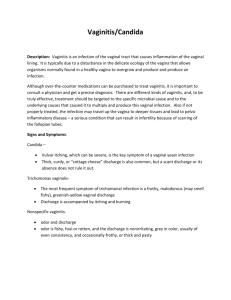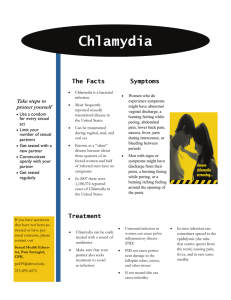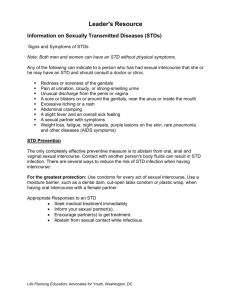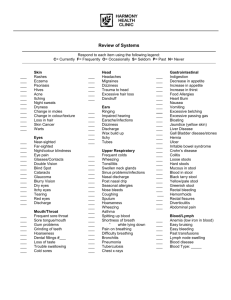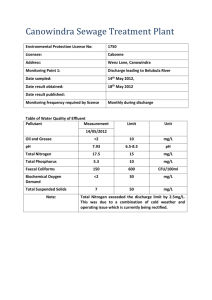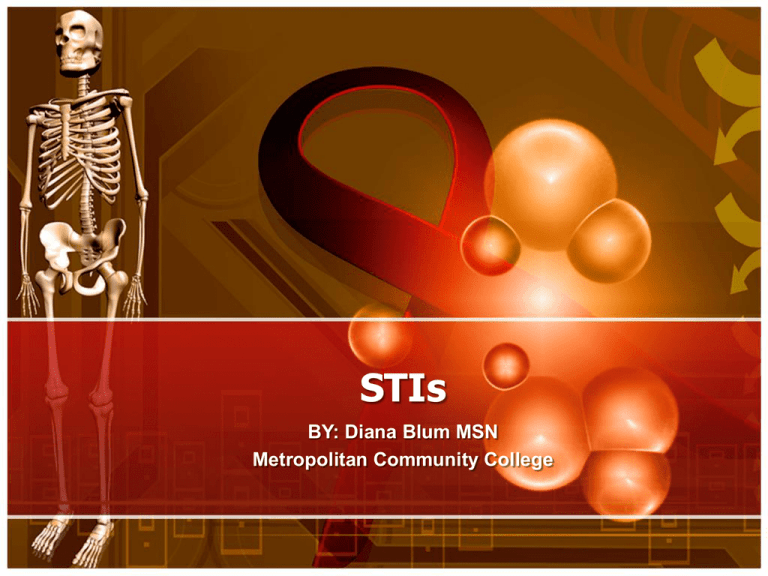
STIs
BY: Diana Blum MSN
Metropolitan Community College
Statistics
•
•
•
•
•
Each year more than 100,000 women are left sterile
19 million infections occur in USA each year
Mostly in 15-24 year olds
Drug Abuse and multiple sex partners are risk factors
Highest in African Americans, Hispanics, and Caucasians
Nursing
•
•
•
•
Know your feelings
Don’t be judgmental
Provide quality care
Reporting is Mandatory: HIV/AIDS, Gonorrhea, Syphilis,
Chlamydia, viral Hepatitis
• Get list of sexual partners
• This slows transmission
• They need treatment as well
Diagnostics
•Serologic Tests: done to detect infection
•Smears and Cultures: many have
discharges/lesions that need
identification and treatment options
Chlamydia
• Chlamydia Infection-caused by virus like bacteria
“chlamydial trachomatis”
• Symptoms usually take 1-3 weeks after infected
• S/s Men
– penile discharge
– Painful
• S/s
woman and frequent urination
– Vaginal discharge & lower abdominal pain
– No symptoms may be experienced
Assessment & Treatment
• Contact transmission by MM in the mouth eyes,
urethra, vagina, rectum
• Take sexual hx
• Chlamydial antigen test
• Cell tissue culture
• Treatment-single dose azithromyacin-Zithromax, or 7
day course of Vibramyacin(doxycycline), no sex til
cured
• Complications: newborns get eye infection or infant
pneumonia, sterility, sperm duct obstruction, PID,
Ectopic Pregnancy, 5x’s more likely to get HIV
chlamydia
Chlamydia Vaginitis
Gonorrhea
• Caused by neissara gonorrhoeate
• S/s female
– Vaginal discharge
– Redness swelling of external genitalia
– Burning on urination
– Abdominal pain
– Abnormal menstruation
– Rectal infection can cause: discharge, anal itch, soreness, bleeding,
painful defecation, sore throat
• S/s male
– d/c from penis that is white or green
– Burning on urination
•
•
•
•
•
•
Transmission can occur from mom to baby
Can not get from toilet seat, door knob, towel
It is possible to be asymptomatic
Symptoms occur 2days to 3 weeks after exposure the disappear
Men are usually more syptomatic
Complications: Sterility, damage to heart, damage to joints, PID, increase
risk of HIV
Treatment
• Single dose of Rocephin IM, Cipro IM or Orthoflex IM followed by 7 days of
oral vibromyacin
• If untreated, can cause sterility
• Person remains infectious if untreated, even though symptoms disappear
after 3-4 weeks
• PCN not used because of resistance issues
• F/U with MD
• Care plan page 1167
Gonorrhea
Syphillis
•
•
•
•
•
Caused by a spirochete Treponoma Pallidum.
9756 cases in 2006 in USA
Can be passed through placenta causing congenital syphilis
S/s progress in 4 stages
Page 1158
First stage
• Chancre-may last from 1 to 5 weeks
• Disappears and becomes a painless red ulcer that may last from 1-5 weeks
then it moves to the blood
• Highly contagious
• Chancre usually noticed 1-12 weeks after initial contact
Primary syphilis-chancre
Primary syphilis - chancre
Primary syphyilis
Second Stage
• Contagious
• Occurs 6 weeks from contact
• Rash on extremities palms of hands, soles of feet and trunk then pustules
develop
• S/S: fever sore throat, general ache
Third Stage-Latent stage
• No Symptoms
• Disease may be spread by blood contact not by sex act itself
• Major organs being invaded
Fourth Stage-Late stage
• Usually 3 years after initial contact
• S/s: BLINDNESS
– MENTAL ILLNESS
– PARALYSIS
– HEART DISEASE
– ARTHRITIS
– NUMB EXTREMITIES
– ULCERS ON SKIN AND ORGANS
– PAIN
– EASIER CHANCE OF GETTING HIV
Diagnosis and Treatment
• Dx based on blood confirmation of organism
• Treatment of choice Pen G injections
• patients allergic to penicillin may be treated with doxycycline 300mg daily
for 21 days or oral amoxycillin 3gm twice daily with 1 gm of probenecid for
2 weeks.
• F/U with Doctor
• No sex for 1 month after treatment
Herpes Simplex
• Type II
– transmitted by sexual contact
– Can be transferred by hand contact
– Virus that causes cold sores (HSV1)
– Avoid Direct Kissing
• S/s
– Painful itching sores around genitals
– Rash ,then blisters
– Flu-like symptoms and burning on urination
– Appearance and lab tests used to dx
Herpes Simplex
• Women
Men
Treatment for Herpes
•
•
•
•
No cure
May keep in check with antivirals
Wash towels/ personal items
Complications: cervical cancer and need for c-sections
Trichomoniasis
• Caused by the parasite Trichomonas Vaginalitis
• 7 million new cases each year
• Usually transmitted sexually but can live on damp clothes and towels
• If found the partner will also need to be treated even if no symptoms
present
S/s women
• blood spotting in vaginal discharge
• heavy, yellowish-green or gray, frothy vaginal discharge
• infection in the urethra
– the tube that carries urine from the bladder out of the body
• itching, burning or pain in the vagina
• lower abdominal pain
• musty vaginal odor
• pain and/or burning when urinating
• pain or discomfort during sexual intercourse (dyspareunia)
• swelling in the groin
• swollen and irritated vagina and cervix
• urinating more than usual
• vaginal or vulval redness
• worsening symptoms when menstruating
Trichomoniasis
• S/s men
– Few or no symptoms
– infection of the urethra or prostate gland, which is
involved in semen production
– painful and/or difficult urination
– thin, whitish discharge from the penis
– tingling inside the penis
– Treatment
• Flagyl is drug of choice
• Diagnostics by microscopic study and cultures
Trichomoniasis
Condylomata Acumulata
•
•
•
•
•
•
•
•
Venereal warts
Caused by HPV (pap smears are highly important)
Incubation is 3 weeks to 8 months
Warts are pink or red and soft with cauliflower like appearance
BX done for diagnosis
High reoccurrence rate
Pregnancy Stimulates large growth
Treatment-removing visible parts of warts for symptom relief via surgery,
cryotherapy, acid burn off or interferon injection
Condylamata
Condylamata
Vulva
Bacterial Vaginosis
•
•
•
•
•
Caused by Gardenella Vaginalis
Associated with multiple sex partners and douching
S/s are grey discharge and fishy odor, itching
Treatment is Flagyl
Client teaching-no alcohol when taking meds as can have a rx with
vomiting, tachycardia and hypotension
Note! Flagyl is contraindicated during
pregnancy so a menstrual history or
pregnancy test should be obtained before
administration
Vaginitis
Etiology:
bacteria
protozoa
viruses
yeasts
The acidic environment (pH less than
5.0) of the vagina inhibits the growth
of many pathogens. Several factors
increase risk for infection.
Factors that increase Risk
•
•
•
•
•
Skin diseases
Skin irritation
Perfumes
Nylon underwear
antibiotics
Diagnosis made from description of
symptoms and identification of
pathogens in sample of vaginal
discharge
Types of vaginitis
candidiasis caused by Candida
albicans, a fungus (cottage cheese like
discharge)
trichomoniasis, caused by
Trichomonas vaginalis, a protozoan
Ways to decrease risk
•
•
•
•
•
•
Avoidance or irritants-chemicals, dyes, soaps
Cotton underwear, nonrestrictive clothing
Frequent cleansing with neutral agents
Heat in the form of sitz baths or irrigation
Avoid sexual intercourse during course of treatment
Review box 49-2 and condom use on page 1170

